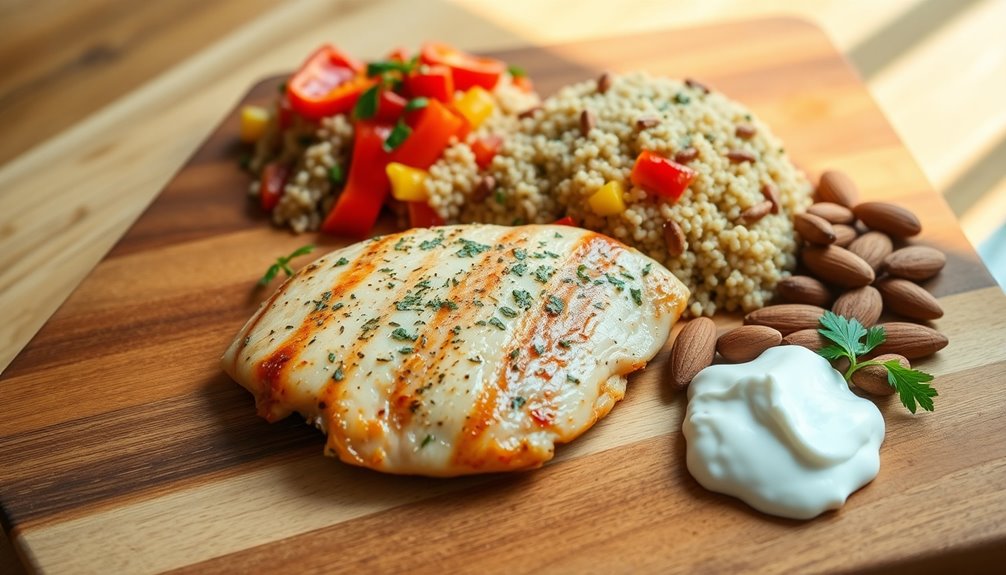When deciding between butter and olive oil, it’s essential to contemplate their flavors and health benefits. Butter adds a rich creaminess to dishes but is high in saturated fats, which can raise cholesterol levels. In contrast, olive oil provides heart-healthy monounsaturated fats and antioxidants that may reduce inflammation. Both can enhance meals in different ways, so using them in moderation might be your best bet. Learn more about how each option fits into your cooking style and dietary goals.
Key Takeaways
- Butter is rich in saturated fats, which may raise cholesterol levels, while olive oil contains heart-healthy monounsaturated fats.
- Olive oil is packed with antioxidants that offer anti-inflammatory benefits, unlike butter.
- Moderate butter consumption can be safe for healthy individuals, but olive oil is generally a better choice for heart health.
- Butter enhances flavor in rich dishes, while olive oil’s versatility makes it suitable for various cooking methods.
- A balanced approach using both ingredients in moderation can optimize flavor and health benefits based on personal dietary goals.

Have you ever wondered which is better for your cooking: butter or olive oil? This age-old debate often boils down to health considerations, flavor preferences, and how you plan to use these ingredients in your dishes. Both butter and olive oil bring unique qualities to your kitchen, but their nutritional profiles can steer your choice depending on your dietary goals.
Butter, a staple in many households, boasts a rich flavor that enhances baked goods and sautéed dishes. It contains a higher dairy fat content, which lends creaminess to your meals. However, this fat isn’t all created equal. Saturated fats found in butter can raise cholesterol levels, which may not be ideal if you’re conscious about heart health. While some studies suggest that moderate butter consumption might not pose significant risks for healthy individuals, it’s essential to weigh your overall dietary habits and personal health conditions.
Butter offers a rich flavor and creaminess to dishes, but its saturated fats may raise cholesterol levels.
On the other hand, olive oil, particularly extra-virgin olive oil, is renowned for its heart health effects. It’s packed with monounsaturated fats that can help lower bad cholesterol levels and reduce the risk of heart disease. The antioxidants found in olive oil also contribute to its anti-inflammatory properties, making it a favorite among health enthusiasts. If you’re looking to incorporate a healthier fat into your cooking, opting for olive oil can be a smart choice. It’s versatile, too—perfect for dressings, drizzling over dishes, or even light frying.
When deciding between butter and olive oil, think about what you’re cooking and the flavors you want to achieve. If you’re making a rich cake or a buttery sauce, butter’s unique taste can’t be easily replicated. However, for sautéing vegetables or dressing salads, olive oil not only elevates the dish but also supports your heart health.
Ultimately, the choice between butter and olive oil depends on your personal taste preferences and health goals. You might find that a balanced approach works best, utilizing both ingredients in moderation to enjoy the benefits and flavors they each provide. By knowing the dairy fat content of butter and understanding the heart health effects of olive oil, you can make informed decisions that suit your cooking style and dietary needs. So, what’s it going to be in your kitchen today?
Frequently Asked Questions
Can I Use Butter and Olive Oil Together in Cooking?
Yes, you can definitely use butter and olive oil together in cooking! This combo enhances flavor pairing, giving your dishes a rich, savory taste. Olive oil adds a fruity note while butter contributes creaminess, making them a versatile duo for various recipes. Whether you’re sautéing vegetables or finishing a sauce, combining them can elevate the overall flavor. Just adjust the amounts to suit your taste, and enjoy the delicious results!
Which Is Better for Baking, Butter or Olive Oil?
When it comes to baking, butter’s your best bet for rich flavor and texture impact. Did you know that baked goods made with butter tend to rise 10% higher than those made with olive oil? While olive oil offers a unique taste, its flavor compatibility can sometimes clash with sweet treats. For flaky pastries and cookies, stick with butter to achieve that perfect balance of taste and texture every time.
Does Olive Oil Have a Higher Smoke Point Than Butter?
Yes, olive oil does have a higher smoke point than butter. In a smoke point comparison, olive oil typically reaches around 375-420°F, while butter usually smokes at about 350°F due to its lower fat composition and the presence of milk solids. This makes olive oil a better option for high-heat cooking, as it can withstand higher temperatures without breaking down. So, for frying or sautéing, you might prefer olive oil over butter.
Are There Any Health Risks Associated With Butter?
Butter can pose health risks, especially if you’re consuming it in large amounts. Think of your heart as a delicate garden; too much saturated fat can lead to weeds like heart disease. While butter’s rich flavor is tempting, its high saturated fat content can raise cholesterol levels, potentially increasing your risk for cardiovascular issues. Moderation is key, so consider balancing your diet with healthier fats to keep that garden thriving.
How Do Butter and Olive Oil Affect Cholesterol Levels Differently?
Butter tends to raise LDL cholesterol, which isn’t great for heart health, while olive oil can help increase HDL cholesterol, the “good” kind. When you choose olive oil, you’re supporting better cholesterol impact and promoting a healthier heart overall. Incorporating olive oil into your diet instead of butter can lead to improved cholesterol levels and a reduced risk of heart disease. So, consider swapping those spreads for a healthier option!
Conclusion
In the epic showdown of butter versus olive oil, it’s a flavor battle for the ages! While butter spreads like a dream, olive oil glides in with heart-healthy goodness that can make your taste buds do a happy dance. You might think you’re torn, but remember: one adds creamy decadence, and the other offers a zesty boost. So, why not embrace both? Life’s too short for bland choices—let your kitchen become the arena of deliciousness!









